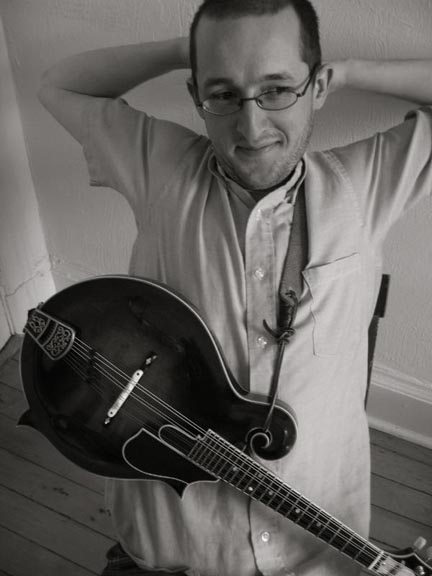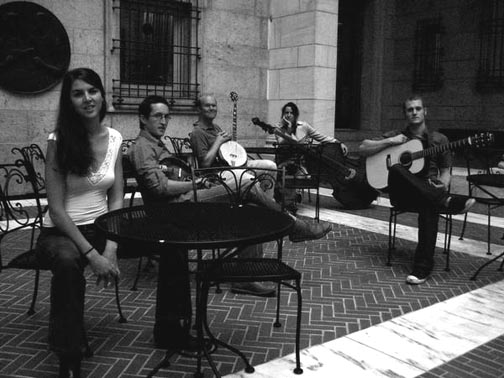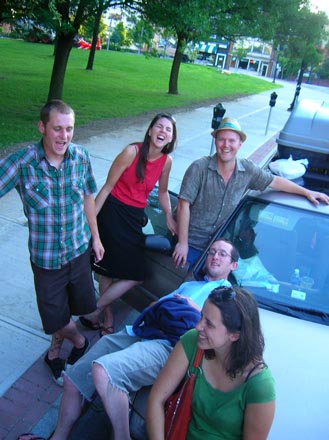Mix Tape: Joe Walsh and Joy Kills Sorrow
Chris Godsey explores the rich music of Joe Walsh, a young mandolin player who uses his dazzling skills and invention on traditional musics.



When Joe Walsh of Duluth decided to become a mandolin player eight or nine years ago, he didn’t just dabble. He became the first mando student ever accepted to the prestigious and demanding Berklee College of Music in Boston.
For two years now he’s hung out with and been taught by some of the world’s best musicians; he’s also joined and formed a few bands, including the genre-inclusive Joy Kills Sorrow, which will play live on 103.3 KUMD (http://www.kumd.org for a live stream) and at the Friends Meeting House in Duluth on Dec. 8, and the Cedar Cultural Center in Minneapolis on Dec. 9.
In addition to all that, Walsh, 26, is revered as a guy of unusual musical and personal depth–someone with so much skill that he could be a self-celebrating jerk, but who gracefully contributes to his environments and the people in them.
MUSICAL FROM THE WOMB
“One important visual image I’ve got of Joe,” said his dad, Kevin Walsh, “is that when he was learning to play the mandolin, he walked around with one on his shoulder all the time”–while having conversations; while circulating at family social functions; while just hanging out around the house; whenever he was awake. “It wasn’t to the exclusion of anything else,” he said. “He just always had it with him.”
Jean Walsh said Joe was the only one of her children who “responded to noises in utero.” He explored multiple instruments (including piano and trombone) before starting to mess around on guitar in eighth grade, just before the Walshes moved to Duluth in 1995. Three or four years later he picked up a mandolin and started playing in earnest when a band he was in already had guitar and banjo players (Joe’s also a good bluegrass-style banjo picker).
And now he’s a good enough mandolin player that professional musicians and scholars with rarified perspective and experience respect him as a potential equal.
A MUSICIAN’S MUSICIAN
“Joe’s got his own voice,” said John McGann, who was hired to teach mandolin at Berklee when Walsh was accepted there, and whose prominence on the instrument is difficult to overstate. “It takes most players a lot more time to develop that. He’s quite precocious…. He’s got the potential to be right at the top…right with anyone else.”
Matt Glaser, head of Berklee’s strings department since 1980 and (among many other professional achievements) an interviewee and senior consultant on the Ken Burns documentary Jazz, said Walsh’s mastery of mandolin fundamentals is obvious to people adept at discerning serious musicians from people who make pleasant noises with instruments.
“He’s got very good timing, tone, and intonation,” Glaser said. “Then on top of that he has the ability to play tastefully and appropriately–not self-indulgently. He’s not a showoff. He has great technique, but he sublimates his ego for the greater good of the band.”
Joy Kills Sorrow guitarist Matthew Arcara echoed Glaser’s comments.
“Joe has bucketloads of technique,” Arcara said, “but he doesn’t play something just because he can–he’s always trying to add something to the song. He’s thinking, ‘What rhythmic thing can I do to help the song?’ instead of, ‘Look at all the notes I can play.’ He just loves the music first.”
IT’S ALL ABOUT THE MUSIC
And he doesn’t just love playing with other professionals. Amateur multi-instrumentalists Chris Julin (guitar, banjo, mandolin, accordion) and Catherine Winter (fiddle, accordion, dulcimer), who live a couple blocks down from Kevin and Jean Walsh on Duluth’s East Second Street, have been playing with Joe for a few years.
“A couple times we saw him and his buddies standing in his front yard playing,” said Julin. “Then one day we were at home and the doorbell rang, and there was a young man with a mandolin saying, ‘I’m Joe. I hear music coming from this house all the time. Do you want to play?’
“He’s the best musician I’ve ever played with. We sat around for a couple hours that first day, and after he went off to college in Maine and Washington State and Boston, he still stops by whenever he’s home.”
Julin said Walsh’s lack of ego is one of the most impressive and important aspects of his musicianship.
“He’s got a huge vocabulary of old-time tunes,” said Julin. “And he just asks anybody if they want to play. That’s a really important part of the ethic of that music–he’ll play with a dirtbag hack like me even after playing with some of the world’s best.”
By “some of the world’s best” Julin means folks like Chris Thile (of the popular bluegrass group Nickel Creek, and, said Walsh, an almost incomprehensibly influential mandolin player), Emmylou Harris, Gillian Welch, Ricky Skaggs, Earl Scruggs, Peter Oustroushko, Bela Fleck, and others.
Kevin Walsh said that when Joe’s in Duluth, their house is always full of musicians, including Roadkill, a group of guys a bit older than Joe, mostly doctors.
“He’s one of the nicest guys you’d ever want to meet,” said Julin. “Very mellow and unassuming. When he talks about playing with people like Chris Thile and Gillian Welch, you get the sense of ‘I got to play with so-and-so.’ He’s not blown away by being in their presence, just very comfortable and appreciative.”
RANDOM YET APROPOS QUOTES ABOUT JOE
Kevin Walsh
“He’s really good at playing spoons. He learned one summer when he was working in the woods in Maine. That’s the only instrument he had out there.”
Jean Walsh
“We’d get so worried when he was a bike messenger in Minneapolis. That’s so dangerous. But he’d say, ‘Mom, how many people do you know who get up every day and love their job?’ “
Matt Glaser
“He’s an amazing guy. Did he tell you about the fishing boat in Alaska? He and his girlfriend went off a summer or two ago and lived on a fishing boat with no phone, no Internet, nothing. That takes a certain amount of spine. I’m not sure I’d have that sort of courage.”
Jean Walsh
“He has a passion for bread baking. He built a cobb oven in our back yard. Whatever he does he does with passion.”
Joe Walsh
“Missing class to play or record is a valid excuse at a school like Berklee, but I think I’m testing some people’s patience.”
Catherine Winter
“Did he tell you that he worked at the women’s shelter here in town? Oh, yeah. He basically just hung out with kids.”
John McGann
“I love the guy. I’m glad I met him. I see us being friends for a long time.”
Joe Walsh
“At both schools [Unity College in Maine and Evergreen College in Washington,] I was playing mandolin much more than studying. So I thought I should go to a school where I could study the mandolin.”
Chris Julin
“He’s mature beyond his years…. He sees himself as an old man. He’s not frumpy or slow moving; he’s just got a sensibility from an older time–the ’40s or ’50s. It took him a while to catch on to computers.”
Jean Walsh
“I never really worry about him, because he carries his joy within himself. If he couldn’t do music, he’d find something that would make him equally happy.”
FILE UNDER…?
Joy Kills Sorrow is an exhilarating amalgamation of genres–bluegrass, jazz, multiple folk traditions, and old-time tunes passed along via ear and voice since before crossing the Atlantic centuries ago–performed with mandolin, acoustic guitar, banjo, standup bass and one woman’s beyond-gorgeous voice.
“We’re still looking for our four-or-five-word definition of what kind of music we play,” Walsh said. “We’ve thought about ‘modern string band’ or ‘granola bluegrass.’ A lot of people end up making up their own terms, because some terms”–like bluegrass–“have such strong connotations.”
According to Arcara, “Joy Kills Sorrow is a fairly open-ended interpretation of what bluegrass music can be. We’re not traditional, by any means. We sort of fall into categories like Americana, newgrass, folk…. It gives us freedom to play what we want.”
Julin said, “I don’t want to say it’s bluegrass, exactly, but it’s close. It’s not exactly old-time, either. It’s just a wonderful blend of a lot of stuff.”
The songs they play–stuff like “Handsome Molly,” “I Still Miss Someone,” and “Liza Jane,”–are always changing, which gives the band plenty of room for all that freedom and interpretation.
“We draw a lot on an old-time repertoire, and it’s an oral tradition,” said Arcara. “A guy in Virginia maybe learned a tune from a guy in Georgia, and the second guy forgot half of it so he made up new verses, and now there are two distinct tunes.”
Both Walsh and Arcara say the band consciously comes up with its own arrangements. Its players’ influences and experiences, too, make it unique.
Singer Heather Masse, banjo player Adam Larrabee, and bassist Bridget Kearney are steeped in jazz. Larrabee teaches jazz theory and composition at the New England Conservatory in Boston, and when Joy Kills Sorrow played Duluth last summer, he did stuff on a banjo that would have seemed impossible if it weren’t happening 20 feet away.
Glaser said Massee gives Joy Kills Sorrow much of its unique quality.
“Bluegrass singing is usually by men, or sometimes women, in three-part harmony,” he said. “Heather’s grounding is in jazz, so she has good ears.”
“When we’ve been most successful as a band,” Walsh said, “is when we’ve abandoned notions of how we define our sound.”
GOOD OLD MINNESOTA HOME
Walsh said he’s looking forward to playing back home. Last summer he managed to sunburn his band mates during an afternoon canoe on the Cloquet River. He’s hoping this trip will show his mates a real Minnesota winter. Regardless, he’ll be ready to play.
“I like to think that people coming to any gig will get the same from me as at any other gig,” he said. “I’m always trying to bring as much of me to any show as I can. I don’t think, ‘I don’t have to try as hard, because Bela Fleck’s not here.’
“If we’re playing a bar gig in Maine for eight people, and we’re not hitting changes and ends together, I’ll go home depressed. Even if everyone in the bar was drunk and didn’t even notice the music, it still affects me.”